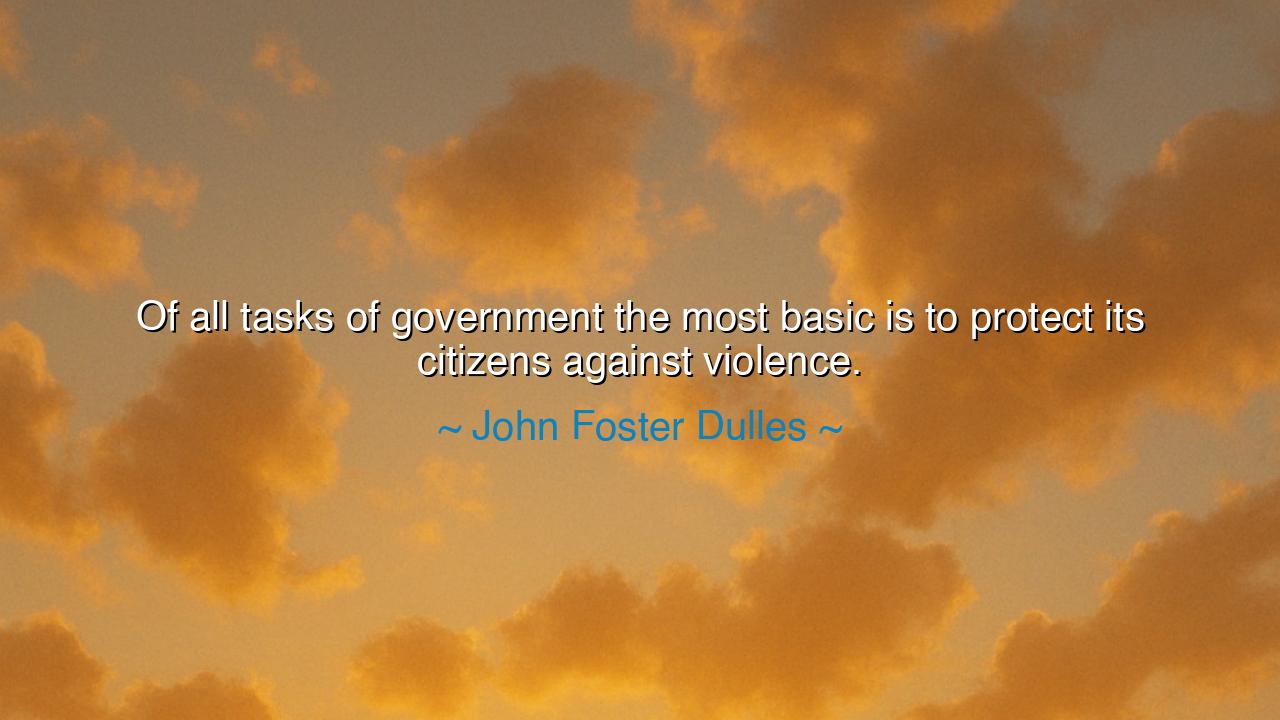
Of all tasks of government the most basic is to protect its






“Of all tasks of government the most basic is to protect its citizens against violence.” Thus spoke John Foster Dulles, a statesman of grave conviction and iron mind, whose words resound like the tolling of a bell through the corridors of power. In this brief yet weighty declaration, he captures the first and most sacred duty of any government — not wealth, not comfort, not grandeur, but protection. For without safety, no liberty endures; without peace, no prosperity can blossom. His words are a call back to first principles — to the foundation upon which every civilization must stand, and without which, all civilization collapses into fear and chaos.
The origin of this quote rests in the turbulent years of the mid-twentieth century, when the world was shadowed by the Cold War and the memories of global conflict still burned fresh in human hearts. John Foster Dulles, who served as Secretary of State under President Dwight D. Eisenhower, was a man burdened with the knowledge that peace is not merely the absence of war but the result of unceasing vigilance. Having witnessed two world wars and the dawn of the nuclear age, he understood that governments may pursue many noble aims — education, justice, welfare, industry — but if they fail to shield their people from violence, all else turns to dust. His words were both an observation and a warning: that in a world of shifting alliances and ideologies, the protection of human life remains the only enduring measure of righteous governance.
To say that protection is the “most basic task” is to acknowledge that it is the foundation upon which all other duties depend. A government may build great cities, raise monuments, or promise plenty — but if the streets run red with blood, if the people fear to walk outside their homes, then those achievements are hollow. Order precedes progress. Peace precedes prosperity. Dulles reminds us that this truth is not political, but moral: to govern is first to safeguard life itself. From the earliest tribes that gathered around the fire to the greatest empires that spanned continents, the first covenant between ruler and ruled has always been the same — protection in exchange for allegiance. To break that covenant is to forfeit legitimacy, to betray the very purpose of the state.
History itself gives witness to this sacred duty. In the twilight of the Roman Republic, corruption spread through the Senate and the city became a den of riots and assassinations. The people, desperate for safety, turned their eyes to Julius Caesar, who promised order at any cost. And thus, liberty fell — not because men hated freedom, but because they feared violence more. The Republic, unguarded and unstable, yielded to empire. Dulles’s words echo that lesson: when governments fail to protect their citizens, chaos rises to fill the void, and from chaos, tyranny is born. Violence, if unchecked, does not merely destroy bodies; it corrodes the soul of nations.
Yet, Dulles’s statement is not merely about armies or police — it speaks to a moral responsibility deeper than force. Protection must be both external and internal. The wise ruler not only guards his people from enemies beyond the borders but also shields them from violence within — the violence of crime, poverty, neglect, and injustice. A government that defends its citizens from foreign invasion but allows them to suffer hunger or oppression has failed its true duty. Protection means creating a society where human life is valued, where every person, rich or poor, can walk in dignity and without fear. To protect against violence, therefore, is not only the task of soldiers but of lawmakers, teachers, and citizens — each holding part of the wall that keeps darkness at bay.
But Dulles, ever the realist, also saw that protection is not achieved once and for all. It demands eternal vigilance, for violence changes its form. In his time, the threats were nuclear and ideological; in ours, they are more subtle — terrorism, cyberwarfare, social unrest, and the erosion of moral order. His wisdom, therefore, is timeless: no government, however strong, can relax in the belief that peace will maintain itself. The forces of destruction — hatred, greed, cruelty — are always waiting at the edges of civilization, patient as the tide. Only when the state remembers its primary duty to protect life can it hope to withstand their return.
Therefore, O listener, take this teaching as a torch for your own time. Do not measure governments by the splendor of their promises, but by the safety of their people. A nation’s greatness is not found in its riches, but in its peace — not in the height of its towers, but in the calm of its homes. Support leaders who understand that protection is not tyranny, and that peace is not weakness. But also remember: the safety of a society is not the work of rulers alone. Each citizen must stand guard in their own sphere — protecting truth from lies, justice from corruption, compassion from cruelty.
For as John Foster Dulles reminds us, all civilization begins with the defense of the human being. When violence reigns, humanity dies; when protection prevails, freedom is reborn. Let every heart, then, be both shield and sanctuary — a protector of peace in its own small realm. For if every person becomes a guardian of life, then the task of government, though heavy, will not be borne alone — and the promise of civilization will yet endure, shining through the ages like a light that no darkness can overcome.






AAdministratorAdministrator
Welcome, honored guests. Please leave a comment, we will respond soon